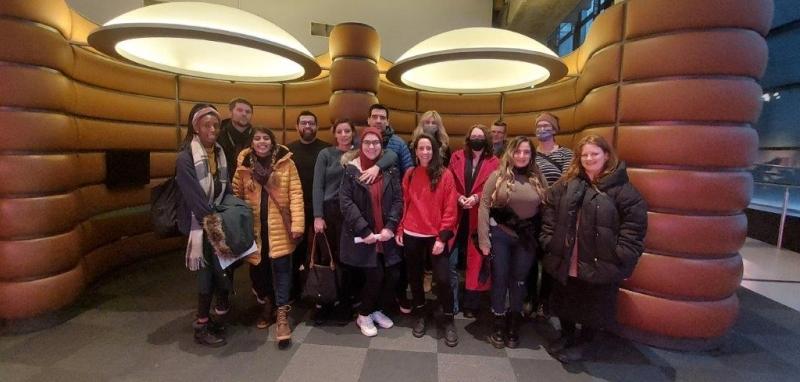MOLA's Network for Ethnically Diverse staff in the context of the UNESCO Universal Declaration on Cultural Diversity
The 21st May marks UNESCO World Day for Cultural Diversity! In this blog, Shantol, Lead of MOLA’s Network for Ethnically Diverse Staff, reflects on the close relationship between the Network and UNESCO’s principles (or ‘articles’) on cultural diversity.
What started the Network for Ethnically Diverse staff?
Article 2 “…it is essential to ensure harmonious interaction among people and groups with plural, varied and dynamic cultural identities as well as their willingness to live together.”
I set up the Network for Ethnically Diverse staff in February 2021, to open a conversation around culture and ethnicity in the workplace. The concept for the Network began in 2019, but the challenges of staff changes, political and social crisis also highlighted the need for such a group.
I felt that colleagues and I needed a safe space as it’s difficult to navigate these conversations, especially in the workplace. Who can you speak to about these experiences? What if I’m misunderstood? As a Black British Caribbean young woman, I understand how it can feel isolating in any setting – home, work or social. Ethnicity is a complex topic, and no experience is the same.
I wanted to create something that would:
- be a safe space for everyone
- be shaped by everyone in the group
- last a long time
- highlight and challenge unjust barriers or exclusions
In February 2021 I put a call out to all MOLA staff to bring together in conversation Network “Members” and “Allies”. Network Members are those of us who identify as globally, ethnically, and culturally diverse, particularly those who may also have experienced discrimination, isolation and racism because of their ethnicity.
Network Allies do not necessarily identify with the background and experiences outlined above but want to actively support, advocate and engage with the topic. The Network is open to all and without a safe space, these conversations might never happen.

We hold monthly confidential virtual meetings and plan social gatherings where we share our skills and experiences in different ways. These different types of meetings allow genuine serious and creative responses to tricky topics. Both types are important for creating a trusting inclusive space which has led to new positive working relationships. A year and a half on the group has thrived and continues to be shaped by staff in all the activities we do.

HOW IS THE NETWORK GOING SO FAR?
Article 10 – Strengthening capacities for creation and dissemination worldwide – In the face of current imbalances it is necessary to reinforce international cooperation and solidarity aimed at enabling all countries, especially developing countries and countries in transition, to establish cultural industries that are viable and competitive at national and international level.
When I set up the group I didn’t know how the idea would be received. I had no expectations, but the last year has shown that many people were seeking the same safe spaces as me. I have found that colleagues are equally passionate about cultural diversity, whether they identify with a particular ethnicity or not.
We all want to be a part of something that helps us to be better equipped when talking about ethnicity and culture. And to turn this into action by creating equitable opportunities for ethnically diverse staff and actively advocating and supporting colleagues in our working spaces.
The Network works with MOLA’s existing governing bodies such as the Union and the Equality, Diversity, and Inclusion (EDI) Working Group. We also have developing links with the leadership team. This has come with challenges but also highlights some positives, like the senior leaders within the organisation who champion the Network. It is important these links continue to grow, to sustain and allow the Network to thrive.
I am proud to have established a workplace group that encourages rich creative connection between staff, celebrates diverse cultures and ethnicities, and always provides a safe space for these challenging and complex conversations. The membership continues to grow and be very committed, even those who joined over a year ago.
During 2022 the Network’s social value has grown as we carefully begin to connect with external groups and individuals who hold similar values. We believe lots of things overlap with ethnicity - mental health, wellbeing and the environment, amongst other things. We’ve begun to hold fundraisers for local and global causes, the first being in aid of British Ukraine Aid.
WHY DOES THIS MATTER?
Article 11 – Building partnerships between the public sector, the private sector and civil society
Embracing cultural diversity within our workspaces is extremely valuable. Looking back now I realise how many of the Network’s values align with UNESCO’s awareness day and its Universal Declaration on Cultural Diversity, and this is vitally important. The declaration reminds us not to act selfishly, that we are part of our local and global communities.
In archaeology it should be the same – what we do is important for everyone. MOLA are carefully excavating sites, learning about different stories of past lives and histories of people’s that shape how we live now. MOLA connects with society and local communities to share this archaeological knowledge for benefit of all.
I believe that no one force alone can preserve or promote cultural diversity. We all have a part to play in cultural diversity, respect and shaping humanity for now and future generations.
World Day for Cultural Diversity for Dialogue and Development (unesco.org)